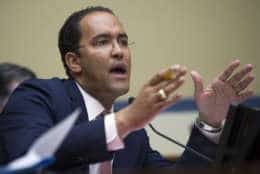machine learning
-
With all the buzz surrounding artificial intelligence, officials at NASA say the technology is helping employees get their arms around all of their data, but the emerging technology isn't going to put rocket scientists out of job anytime soon.
May 28, 2018 -
Gen. Raymond Thomas, the commander of U.S. Special Operations Command (SOCOM), is looking to the corporate world for examples on how to successfully implement machine learning and artificial intelligence into his command.
April 27, 2018 -
The Defense Department is working to wrangle artificial intelligence projects across 40 different DoD organizations into a coherent S&T investment strategy.
March 20, 2018 -
The head of the intelligence community's advanced research agency is looking at new encryption standards that can withstand future breakthroughs in quantum computing.
March 15, 2018 -
For all the talk in government about artificial intelligence, many of the AI tools in use by federal agencies today carry out a modest set of responsibilities.
March 08, 2018 -
Gary Newgaard, the vice president of public sector for Pure Storage, details seven ways agencies should prepare to use artificial intelligence.
February 27, 2018 -
For the DoD, AI and machine learning in the cloud have the potential to do more than just basic back-office work.
February 15, 2018 -
Federal agencies are embracing the idea of artificial intelligence, and in test cases, adopting machine learning has cut down on some of the tedious aspects of working with government data.
January 09, 2018 -
Eric Trexler, the executive director of national security and civilian programs for McAfee, explains why machine learning is the fastest way to identify attacks and mitigate their impact.
November 08, 2017 How is technology changing the way government operates? Find out when Dcode Founder & CEO Meagan Metzger, and Thresher CEO Rebecca Fair join host John Gilroy on this week's Federal Tech Talk. October 17, 2017
October 16, 2017-
New data, technology create an avenue for public and agencies to grow closer together
August 30, 2017 -
The Navy has just stood up a new “digital warfare” office, prompted by the notion that the service is awash in valuable, but largely untapped data in areas ranging from acquisition, maintenance and audit readiness to the ways it trains and equips its sailors.
February 24, 2017 -
Artificial intelligence has many definitions and even more uses, and the federal government is embracing this emerging technology. In a two-day special report, Federal News Radio looks at AI, government policies to regulate it, and how agencies are using this technology.
December 06, 2016 -
David Bray, the Federal Communications Commission’s chief information officer, said cutting edge technology from the Internet of things to artificial intelligence is giving agencies an opportunity to rethink how they serve their customers and therefore what it means to work in the public sector.
October 26, 2016 -
Carol Mullins, the associate commissioner for the Office of Technology and Survey Processing for the Labor Department’s Bureau of Labor Statistics, said the bureau’s effort to reduce its servers, applications and other IT components is coming to fruition over the next year.
August 26, 2016













